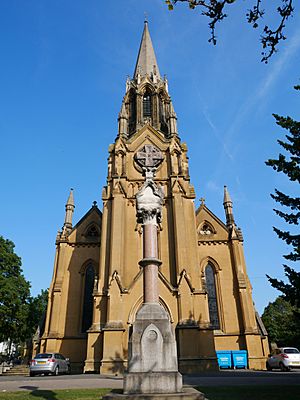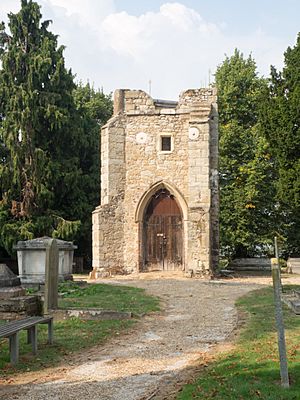St Margaret's, Lee facts for kids
Quick facts for kids St. Margaret of Antioch |
|
|---|---|

St. Margaret of Antioch, Lee Green, south east London
|
|
| Denomination | Church of England |
| Churchmanship | Broad Church |
| History | |
| Dedication | St. Margaret of Antioch |
| Administration | |
| Parish | St Margaret of Antioch, Lee |
| Diocese | Southwark |
| Province | Canterbury |
St. Margaret's Church in Lee is a special place of worship in Lee, London. It's a Church of England parish church, which means it serves the local community. This beautiful church was built between 1839 and 1841. It replaced a much older church that dated back to around 1120!
The church was designed by an architect named John Brown. It has a simple, early Victorian style. Later, between 1875 and 1900, the inside of the church was decorated with many fancy details.
By 1980, the church building needed a lot of repair. A big restoration project started and lasted for 20 years. Today, St. Margaret's Church is one of the best examples of a decorated Gothic Revival style inside in London.
A Look at the Old Church
Before the current church was built, there was a medieval church on the same spot. This older church was built around 1120.
Between 1813 and 1830, people tried to rebuild the medieval church. However, the old foundations were not strong enough for a new building. Because of this, a completely new church was built nearby.
The ruins of the original medieval church can still be seen. They are in the old churchyard on the north side of Lee Terrace.
Famous People Buried Here
The churchyard of St. Margaret's is home to some very important graves. One famous person buried here is Edmond Halley (1656–1742). He was England's second Astronomer Royal starting in 1720. He is famous for discovering that Halley's Comet appears regularly.
Two other Astronomers Royal, Nathaniel Bliss and John Pond, are also buried at St. Margaret's. This makes it a unique place with three such important scientists.
Other notable people buried in the churchyard include Sir Samuel Fludyer, 1st Baronet and his family. Also, William Webster (1819–1888), a wealthy builder, is buried near the current church. His wife and son, William, a chemical engineer, are also buried with him.
More Information
- The Church's Parish Website
- About the Current Church
- History of the Parish
- Craftsmen and Women
- The Old Church Yard
- Gallery of Interior Features
 | Aurelia Browder |
 | Nannie Helen Burroughs |
 | Michelle Alexander |


